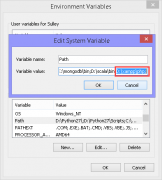本文实例讲述了PHP封装的非对称加密RSA算法。分享给大家供大家参考,具体如下:
将php的openssl扩展中的非对称加密函数封装成一个Rsa类。
需要注意的是,在windows上,需要打开openssl的配置文件,请参照官方的openssl扩展安装文档。
在windows上安装openssl扩展
1、将php路径下的两个库文件libeay32.dll和ssleay32.dll复制到操作system32下
2、配置openssl配置文件的位置,在php的路径下,有文件extras/openssl/openssl.cnf,添加环境变量OPENSSL_CONF指向这个文件的全路径。如何添加环境变量请google搜索之。
3、在php.ini里添加一行extension=php_openssl.dll
使用的demo:
//====================demo=======================
//以下是一个简单的测试demo,如果不需要请删除
$rsa = new Rsa('sslkey'); //sslkey为存放密钥的路径,将已有的密钥文件复制到该路径下,公钥名称为pub.key,私钥名称为priv.key
$rsa->createKey(); //创建一对密钥,如果密钥对已经存在,不需调用
//私钥加密,公钥解密
echo 'source:服务器之家<br />';
$pre = $rsa->privEncrypt('服务器之家');
echo 'private encrypted:<br />' . $pre . '<br />';
$pud = $rsa->pubDecrypt($pre);
echo 'public decrypted:' . $pud . '<br />';
//公钥加密,私钥解密
echo 'source:干IT的<br />';
$pue = $rsa->pubEncrypt('干IT的');
echo 'public encrypt:<br />' . $pue . '<br />';
$prd = $rsa->privDecrypt($pue);
echo 'private decrypt:' . $prd;
//========================demo======================
本示例在windows7、php 5.2.14、openssl 0.98下开发
<?php
/**
* 使用openssl实现非对称加密
*
*/
class Rsa
{
/**
* private key
*/
private $_privKey;
/**
* public key
*/
private $_pubKey;
/**
* the keys saving path
*/
private $_keyPath;
/**
* the construtor,the param $path is the keys saving path
*/
public function __construct($path)
{
if(empty($path) || !is_dir($path)){
throw new Exception('Must set the keys save path');
}
$this->_keyPath = $path;
}
/**
* create the key pair,save the key to $this->_keyPath
*/
public function createKey()
{
$r = openssl_pkey_new();
openssl_pkey_export($r, $privKey);
file_put_contents($this->_keyPath . DIRECTORY_SEPARATOR . 'priv.key', $privKey);
$this->_privKey = openssl_pkey_get_private($privKey);
$rp = openssl_pkey_get_details($r);
$pubKey = $rp['key'];
file_put_contents($this->_keyPath . DIRECTORY_SEPARATOR . 'pub.key', $pubKey);
$this->_pubKey = openssl_pkey_get_public($pubKey);
}
/**
* setup the private key
*/
public function setupPrivKey()
{
if(is_resource($this->_privKey)){
return true;
}
$file = $this->_keyPath . DIRECTORY_SEPARATOR . 'priv.key';
$prk = file_get_contents($file);
$this->_privKey = openssl_pkey_get_private($prk);
return true;
}
/**
* setup the public key
*/
public function setupPubKey()
{
if(is_resource($this->_pubKey)){
return true;
}
$file = $this->_keyPath . DIRECTORY_SEPARATOR . 'pub.key';
$puk = file_get_contents($file);
$this->_pubKey = openssl_pkey_get_public($puk);
return true;
}
/**
* encrypt with the private key
*/
public function privEncrypt($data)
{
if(!is_string($data)){
return null;
}
$this->setupPrivKey();
$r = openssl_private_encrypt($data, $encrypted, $this->_privKey);
if($r){
return base64_encode($encrypted);
}
return null;
}
/**
* decrypt with the private key
*/
public function privDecrypt($encrypted)
{
if(!is_string($encrypted)){
return null;
}
$this->setupPrivKey();
$encrypted = base64_decode($encrypted);
$r = openssl_private_decrypt($encrypted, $decrypted, $this->_privKey);
if($r){
return $decrypted;
}
return null;
}
/**
* encrypt with public key
*/
public function pubEncrypt($data)
{
if(!is_string($data)){
return null;
}
$this->setupPubKey();
$r = openssl_public_encrypt($data, $encrypted, $this->_pubKey);
if($r){
return base64_encode($encrypted);
}
return null;
}
/**
* decrypt with the public key
*/
public function pubDecrypt($crypted)
{
if(!is_string($crypted)){
return null;
}
$this->setupPubKey();
$crypted = base64_decode($crypted);
$r = openssl_public_decrypt($crypted, $decrypted, $this->_pubKey);
if($r){
return $decrypted;
}
return null;
}
public function __destruct()
{
@ fclose($this->_privKey);
@ fclose($this->_pubKey);
}
}
希望本文所述对大家PHP程序设计有所帮助。














